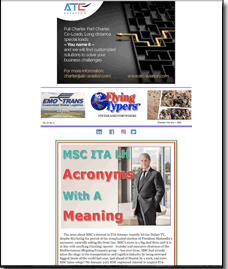|
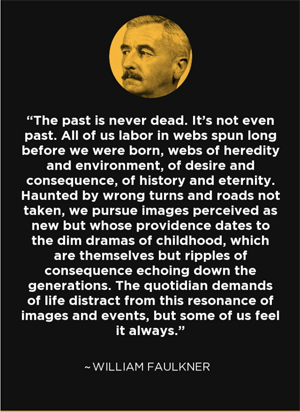 “The
past is never dead. It’s not even past.” Requiem
for a Nun, 1951 by William Faulkner “The
past is never dead. It’s not even past.” Requiem
for a Nun, 1951 by William Faulkner
A native of New Albany, Mississippi,
William Faulkner’s words written more than seventy years ago
have retained all their relevance after decades of being quoted
by academics and statesmen – in consolation, reconciliation,
desperation, and exasperation.
My mother was born and raised in a
Mississippi Delta town (Cleveland) about 115 miles south of Memphis
on Highway 61. I spent summers there in the 1960s and early 1970s.
My grandfather owned a scrap metal yard on Main Street. My aunt
and uncle owned a hunting goods store next to the highway. When
I say “y’all”, it’s muscle memory and not
affectation. I am wary of people who dislike grits. I started my
aviation career in the early 1990s working for the airport authority
in Jackson, so my experience in Mississippi was formative personally
and professionally.
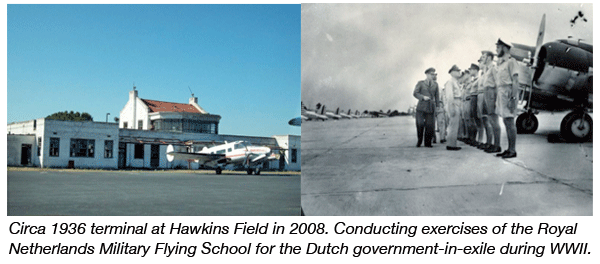 |
Until 1963, Jackson’s
principal airport was Hawkins Field, which has the distinction of
being the destination for Delta Air Lines’ first commercial
flight in 1929. Hawkins Field also served as the Royal Netherlands
Military Flying School for the Dutch government-in-exile during WWII.
It still serves general aviation but on 600 acres in an urban setting,
Hawkins was insufficient for the coming “Jet Age”.
Groundbreaking for a new land-rich
airport occurred in August 1959. Jackson’s then-mayor, Allen
Thompson thanked “taxpayers who are going to pay for it”.
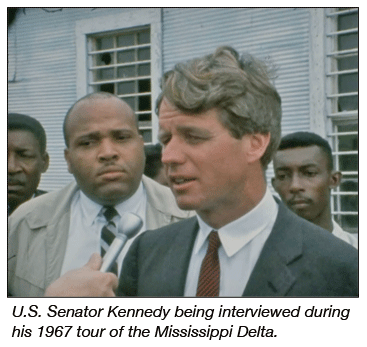 Indeed,
they would but not before U.S. Attorney General Robert F. Kennedy
successfully tied federal funds to prohibitions against segregated
bathrooms, dining areas and other public facilities. Local governments
actually claimed segregated facilities would be improvements over
Hawkins Field where no “colored” restrooms existed at
all. Indeed,
they would but not before U.S. Attorney General Robert F. Kennedy
successfully tied federal funds to prohibitions against segregated
bathrooms, dining areas and other public facilities. Local governments
actually claimed segregated facilities would be improvements over
Hawkins Field where no “colored” restrooms existed at
all.
The Kennedy Administration
used the Interstate Commerce Commission to integrate bus and rail
stations, as well as airports. “During 1962, we surveyed 165
airports in 14 states and found 15 airports in six of those states
which were still segregated. All of these desegregated during the
year, 13 voluntarily and two after the Department brought legal action.
At present, then, there are no segregated airport facilities in the
nation. There is only one city in the nation, Jackson, Mississippi,
in which systematic segregation at interstate rail and bus facilities
– as exemplified by signs directing the use of separate facilities
– is still attempted. Even in this case we have taken legal
action, now on appeal.”
The
new airport opened on July 1, 1963. For decades, it was known as Allen
C. Thompson Field honoring a segregationist mayor who usually preferred
closing public facilities to integrating them. A member of the fervently
racist White Citizens Council, Thompson purchased an International
Harvester Loadstar 1600 (dubbed “Thompson’s Tank”)
outfitted with armor, metal bars, grating, searchlights, sirens and
mounted machine guns.
“Thompson’s
Tank” had its first use at the local HBCU (Historically Black
Colleges & Universities) Jackson State University in February
1964. It would appear again at Jackson State in May 1970 when Jackson
police and Mississippi Highway Patrol fired 460 rounds into a dormitory
under the pretense of observing a sniper on the dorm’s upper
floors. An FBI investigation found no evidence to support that ruse
for murdering two college students and injuring twelve more. It took
local law enforcement more than fifty years to finally apologize.
“Thompson’s Tank” was borrowed by Memphis Police
to provide safe transport for James Earl Ray, following his assassination
of Martin Luther King, Jr.
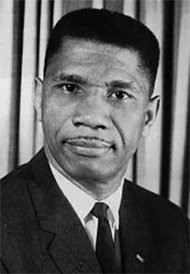 Medgar
Wiley Evers was a decorated U.S. Army combat veteran of WWII and a
graduate from HBCU Alcorn State University. Evers was the NAACP’s
first field secretary in Mississippi and organized a boycott of downtown
Jackson businesses, demanding more equitable treatment for Black employees
and customers. “Radical” demands included use of identical
common courtesy titles (Mrs., Miss, and Mr.) for Black peers as used
for White peers, as well as first-come, first-served service. Medgar
Wiley Evers was a decorated U.S. Army combat veteran of WWII and a
graduate from HBCU Alcorn State University. Evers was the NAACP’s
first field secretary in Mississippi and organized a boycott of downtown
Jackson businesses, demanding more equitable treatment for Black employees
and customers. “Radical” demands included use of identical
common courtesy titles (Mrs., Miss, and Mr.) for Black peers as used
for White peers, as well as first-come, first-served service.
Just after midnight on June
12, 1963, Medgar Evers was murdered in the driveway of his family
home. The murderer was Mayor Thompson’s fellow White Citizens
Council extremist Byron De La Beckwith who openly bragged about the
murder and yet two all-White, male juries failed to convict. Mississippi’s
racist governor, Ross Barnett (for whom the reservoir outside Jackson
is still named) appeared in court to shake the murderer’s hand.
De La Beckwith escaped justice until 1994 when new evidence allowed
prosecutors to retry the case with a jury amenable to justice.
Medgar Evers was buried with
full military honors at Arlington National Cemetery. Evers’
widow, Myrlie Evers-Williams, has led a noble life of service to causes
once championed by her late husband. Evers-Williams later served as
chairwoman of the NAACP and delivered the invocation at the second
presidential inauguration of Barack Obama.
As
“White flight” filled the suburbs, Jackson’s demographics
changed. In 1997, Harvey Johnson Jr. was elected as Jackson’s
first African American mayor. On January 22, 2005, the airport’s
name was changed to Jackson-Evers International Airport and then in
October 2011, to Jackson-Medgar Wiley Evers International Airport
– honoring a man assassinated less than a month before the airport
opened in 1963. “The past is never dead”, indeed, but
the present allows for improvement.
Mississippi’s
current governor and state legislature are attempting to wrest airport
governance from the Black-majority city but are content to leave the
state’s other airports in White-majority cities to local control.
Many Black Mississippians still can recall being prohibited from using
public restrooms in Mississippi. The governor and many legislators
were raised by people who sustained segregation and ensured the freedom
of murderers who’d killed Black citizens. Apparently, having
Black governance of the Capital City airport is just more than they
can endure. At least for now, there is a Civil Rights collection displayed
at the airport’s Medgar Evers Pavilion. I strongly recommend
visiting that collection now before Mississippi’s leadership
buries the evidence again.
From 1993 to 1997,
I started my airport career as the Director of Marketing & Economic
Development for the Jackson Municipal Airport Authority - governed
by a Board of Commissioners appointed by the Mayor of Jackson and
confirmed by its City Council.
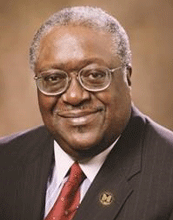 Among
the Commissioners for whom I worked were Booker Taliaferro (“B.T.”)
Jones - a native of Chulahoma, Mississippi. B.T. enlisted in the
U.S. Navy in 1961, serving as a navigator on aircraft carriers USS
Oriskany and USS Kitty Hawk in the South China Sea during the Vietnam
War. After his honorable discharge, B.T. received a degree in sociology
from Indiana State University. B.T was President and CEO of MINACT,
Inc. – a national job training firm which became one of the
largest Job Corps contractors in America. The company received many
awards, but none would mean more to B.T. than preparing so many
Americans to make a living. B.T. passed away on July 27, 2019. Among
the Commissioners for whom I worked were Booker Taliaferro (“B.T.”)
Jones - a native of Chulahoma, Mississippi. B.T. enlisted in the
U.S. Navy in 1961, serving as a navigator on aircraft carriers USS
Oriskany and USS Kitty Hawk in the South China Sea during the Vietnam
War. After his honorable discharge, B.T. received a degree in sociology
from Indiana State University. B.T was President and CEO of MINACT,
Inc. – a national job training firm which became one of the
largest Job Corps contractors in America. The company received many
awards, but none would mean more to B.T. than preparing so many
Americans to make a living. B.T. passed away on July 27, 2019.
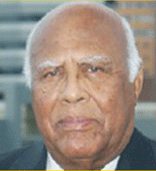 Born
in 1927, Cornelius (“C”) Turner (right) was
one of twelve children born on a farm in Edwards, Mississippi. Still
legally a minor during WWII, Cornelius joined the Merchant Marine
to sail on Liberty cargo ships. In 1963, Mr. Turner established
Major Associates Inc., becoming one of the first Black contractors
in Mississippi to be bonded. In the early 60s, Mr. Turner shared
an office with Medgar Evers and was close friends with Vernon Dahmer
– president of the Forrest County Chapter of the NAACP. Born
in 1927, Cornelius (“C”) Turner (right) was
one of twelve children born on a farm in Edwards, Mississippi. Still
legally a minor during WWII, Cornelius joined the Merchant Marine
to sail on Liberty cargo ships. In 1963, Mr. Turner established
Major Associates Inc., becoming one of the first Black contractors
in Mississippi to be bonded. In the early 60s, Mr. Turner shared
an office with Medgar Evers and was close friends with Vernon Dahmer
– president of the Forrest County Chapter of the NAACP. 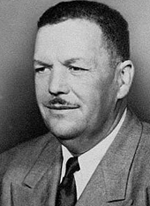 Dahmer
(left) suffered fatal injuries protecting his family when
the Ku Klux Klan attacked his family home with gasoline bombs and
shotguns. Dahmer’s four sons were away on military duty. The
ringleader of Dahmer’s murder would not be convicted for twenty-five
years. Dahmer
(left) suffered fatal injuries protecting his family when
the Ku Klux Klan attacked his family home with gasoline bombs and
shotguns. Dahmer’s four sons were away on military duty. The
ringleader of Dahmer’s murder would not be convicted for twenty-five
years.
Cornelius Turner passed away
at the age of 91, on June 7, 2019, having been married to his beloved
Marian for more than seventy years. Marian passed away in April
2021 at the age of 96.
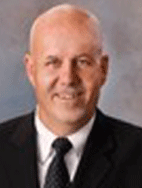 It
took years of hindsight for me to fully appreciate the airport’s
Dutch-born executive director – Dirk B. Vanderleest (right)
– who hired me for my first job in airport marketing.
Dirk’s unfailingly even disposition was critically necessary
for an organization in a transformative place and time. I learned
a lot about airports working for Dirk but even more about managing
people. He is now the Aviation Director for the City of Concord
(NC) at Concord-Padgett Regional Airport. Thank you, Dirk. It
took years of hindsight for me to fully appreciate the airport’s
Dutch-born executive director – Dirk B. Vanderleest (right)
– who hired me for my first job in airport marketing.
Dirk’s unfailingly even disposition was critically necessary
for an organization in a transformative place and time. I learned
a lot about airports working for Dirk but even more about managing
people. He is now the Aviation Director for the City of Concord
(NC) at Concord-Padgett Regional Airport. Thank you, Dirk.
Working at airports provides
opportunities to meet local and national celebrities. During my time
there, Jackson was unusually interesting, as three Hollywood films
– “Ghosts of Mississippi”, “A Time to Kill”
and “The Chamber” – filmed locally and used JAN
for airport scenes. “Ghosts of Mississippi” depicted historical
events (the murder of Medgar Evers and trial of his murderer), but
all credibly addressed Mississippi’s racial strife with the
other two films based on novels by Mississippian John Grisham.
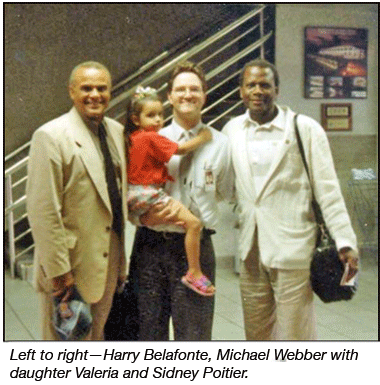 Close
proximity to HBCUs provided frequent opportunities to meet legendary
athletes like Walter Payton whose brother coached the golf team at
Payton’s alma mater, Jackson State. I occasionally guest-lectured
at JSU and hired an intern from there. Close
proximity to HBCUs provided frequent opportunities to meet legendary
athletes like Walter Payton whose brother coached the golf team at
Payton’s alma mater, Jackson State. I occasionally guest-lectured
at JSU and hired an intern from there.
On
another occasion, I met Harry Belafonte and Sidney Poitier who were
marking the 30th anniversary of Freedom Summer (first called the “Mississippi
Summer Project”) for which they had raised and delivered critical
funds to Mississippi in 1964, even as the KKK prowled around. In June
1994, we also received the families of James Chaney, Andrew Goodman
and Michael Schwerner – three martyrs abducted by police and
murdered by the KKK in June 1964 in Philadelphia, MS.
None
of this is ancient history. I am grateful to have worked for men like
B.T. Jones and Cornelius Turner. These extraordinary men were born
into a society that prohibited them from even using public airport
restrooms, but they became airport commissioners, in recognition of
their professional achievements. I mourn their passing but their impacts
will outlive the unworthy politicians now desperately trying to reverse
the achievements of the Civil Rights movement.
Additional
U.S. airports named for Civil Rights leaders include: Georgia’s
Hartsfield-Jackson Atlanta International Airport which in 2003 amended
the name to honor former Mayor Maynard Jackson; Alabama’s Birmingham-Shuttlesworth
International Airport named for Fred Shuttlesworth who was instrumental
in founding the Southern Christian Leadership Conference and planning
the Birmingham Campaign in 1963; and Baltimore/Washington International
Thurgood Marshall Airport. UPS has its global hub at Louisville Muhammad
Ali International Airport. The main terminal here in Austin, TX is
named for the great Barbara Jordan whose statue overlooks the baggage
carousels.
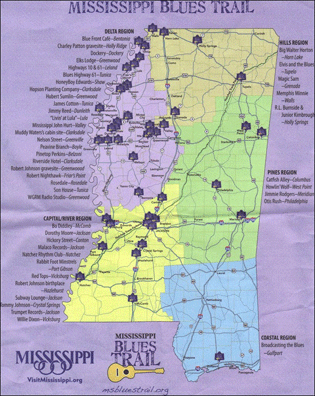 Mississippi
Soundtrack: Mississippi
Soundtrack:
Here’s a cross-section of Soul, Blues, Gospel, Country and Rock
that provides more than enough evidence that Mississippi has no peers
in its impact on the bedrock of American music:
“I’ll
Take You There” (The Staple Singers, Winona and Drew, MS)
“How
Blue Can You Get” (BB King, Indianola, Mississippi)
“Hoochie
Coochie Man” (Muddy Waters, Clarksdale, Mississippi but
may have been Rolling Fork, MS)
“Love
In Vain” (Robert Johnson, Hazlehurst, MS)
“Mule
Skinner Blues” (Jimmie Rodgers, Meridian, MS)
“All
I Have To Offer You Is Me” (Charley Pride, Sledge, MS)
“It’s
Only Make Believe” (Conway Twitty, Friars Point, MS)
“Bo Diddley”
(Bo Diddley, McComb, MS)
“Jailhouse
Rock” (Elvis Presley, Tupelo, MS)
“Your
Good Girl’s Gonna Go Bad” (Tammy Wynette, Tremont,
MS)
“The
Lord’s Prayer” (Leontyne Price, Laurel, MS)
“Misty
Blue” (Dorothy Moore, Jackson, MS)
“When
I Rose This Morning” (The Mississippi Mass Choir, Jackson,
MS)
Michael Webber
|




